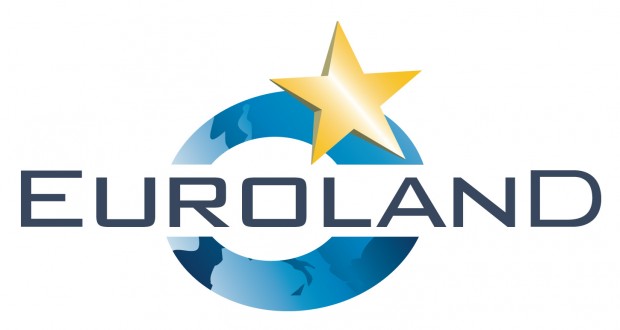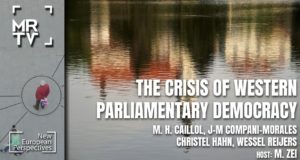The present pause in the march towards the creation of the new political European entity Euroland, consequence of the approaching European elections, which virtually put the entire communitarian system on stand-by, enable us to dedicate this lead article of our April newsletter to an abnormality in the handling of the evolution of Euroland : How is it possible that a member states of the European Union, which is not a member of the Eurozone, has such a disproportionate clout on the institutions where the coming of age of Euroland is being masterminded and prepared?
European Parliament: The Euro committee in the hands of a national of a Eurozone member state
Let’s have at first a look at the European Parliament and within the EP the relevant committee for economic and monetary affairs, the so-called ECON, which deals mostly, as the second adjective points at, with the affairs of the Eurozone.
In order to understand its functioning and most of all its importance, it is helpful to take a closer look at the descriptions of its competences and attributions as put forward by its chairwoman in its welcoming remarks on the committee’s internet website (emphasizes by the author): « The European Parliament is a major agenda-setter in the area of European policy and the Economic and Monetary Affairs Committee (ECON) plays a key role in the work of the Parliament. It has responsibility for such matters as the economic and monetary policies of the EU, taxation and competition policies, free movement of capital and the regulation of financial services (banks, insurance, pension funds, asset/fund management, accounting, international monetary and financial systems etc.). Moreover, as the great majority of Parliament’s work is done at Committee level, it is ECON that does most Parliamentary work on these key economic and monetary policy areas. This puts ECON at the center of the Parliament’s work on the current economic and financial crisis and gives ECON significant influence on the policy agenda in the EU and internationally.
As regards the monetary policies of the Union and the functioning of EMU and the European monetary system, the accountability of the ECB vis-à-vis the Parliament plays a key role, as it acts as an important counterbalance to the central bank’s independence.
ECON plays a key role in making EU law, because the Parliament is, together with the Council, the EU’s co-legislator in most EU policy areas. EU law often determines the national laws and regulations in Member States, especially in financial services and, after the entry into force of the Treaty of Lisbon, in the area of EU economic governance. This allows an ECON Members to shape EU law in these important areas of EU policy.”
So let’s get this clear : ECON co-makes the European laws and regulations of the financial sector and constitutes the only counterbalance to the ECB, which otherwise would be completely cut off the political sphere. How is it then possible that its chairwoman, Sharon Bowles , is a national of a member state the government of which is outright hostile to the Euro? A government which actively participated in the anti- euro propaganda during the euro crisis? Which refuses to co-finance the European instruments like the ESM which made the rescue of the common currency possible? Where does she draw the legitimacy from to want to chair the discussions about the creation of the banking union of which her own country will stay away from?
These questions are in no way apprehensions regarding her professional capacities which are – according to what is said and heard within the allies of the European Parliament- impeccable, but absolutely and rightfully question the political wisdom to confide such an important function to someone who by her nationality is not concerned by the topics she deals with. It would appear politically much wiser – as it is done in all states – to confide a regal function only to people that are nationals of that given states. As there is not yet a Euroland nationality, the closest substitute for this should be to this should be to confide it to a national of a member state of the Eurozone (or at least to a state which has made clear its intentions to join the zone in the foreseeable future. In order to make sure that in the future the affairs of Euroland be in the hands of the Eurolish, the next chairman/woman of ECON definitely has to fulfil this condition of national allegiance to the Eurozone.
Banking authorities for the Eurozone within the Eurozone
Furthermore, how did it come to pass that the headquarter of the European Banking Authority, created in 2011 by the European Union, had been built in London ? Of course, London is the most important financial hub in Europe. But with the creation of the banking union by the member states of the Eurozone, it is high time to finally concentrate all transactions in Euros within that zone and to build one or more Euro-financial hubs within Euroland, for instance in Frankfort, Paris or Milan. At least, there is some consolation in the fact that that the single supervisory mechanism, attached to the ECB in Frankfort and becoming operational in 2014, will toll the bell for this another European agency of purely symbolic attributions deprived of any real interest for the efficient surveillance of European financial institutions .
Let’s do away with the Anglo- Saxon monopoly on audits in the Eurozone
And last, so not least, EUobserver informs us of a similar scandal, unfortunately not taken up by the other European medias: The legal affairs committee of the European Parliament has approuved a position of the Council and the Commission regarding the reform of regulations governing the activities of international audit agencies. Initially, that reform was intended to limit the almost exclusive control of the four big agencies (PriceWaterhouseCoopers, Deloitte, Ernst&Young et KPMG) of the European market and to open it up to more competition, in particular to give more space for smaller agencies. But at the end of the day, this reform has been gutted of its relevance and will be without any effect on the reality of the Anglo-Saxon monopoly on this important financial and economic activity – much to the great joy of the British conservative party, notoriously hostile to the Euro. And what were the nationality and the party affiliation of the Parliament’s rapporteur? British and conservative!
There is absolutely no cause for astonishment that Euroland is incapable of prevailing as an autonomous political entity if it further on accepts to be sabotaged by the non- Eurolander, who have major stakes in preventing it from doing so. We must finally put away this nonsensical notion that Europe and its future is the affair of all the member states of the EU, that the interests of all must be heard, even when they are not concerned by the topics discussed. Europe’s future is Euroland. The British have abandoned the playing field and must accept to not participate any more. They still can jump the wagon when they finally will have understood that the future of the United Kingdom is with and not against Europe.
———-
Helpful information:
Deutsche Wirtschafts Nachrichten: Schäuble will neues Parlament für Euro-Staaten gründen
Europolitics: EPP Opposes New Subcommittee on Eurozone Issues
Deutsche Wirtschafts Nachrichten: Dänische Regierung will der Euro- Zone beitreten
Other media voices :
EUobserver : Would a eurozone committee enrich the EU parliament?
EUobserver : EU audit reform reduced to ‘paper tiger’
Handelsblatt: Eurozone als Schicksalsgemeinschaft


 LEAP2040 Toutes les informations et archives Europe2040
LEAP2040 Toutes les informations et archives Europe2040



